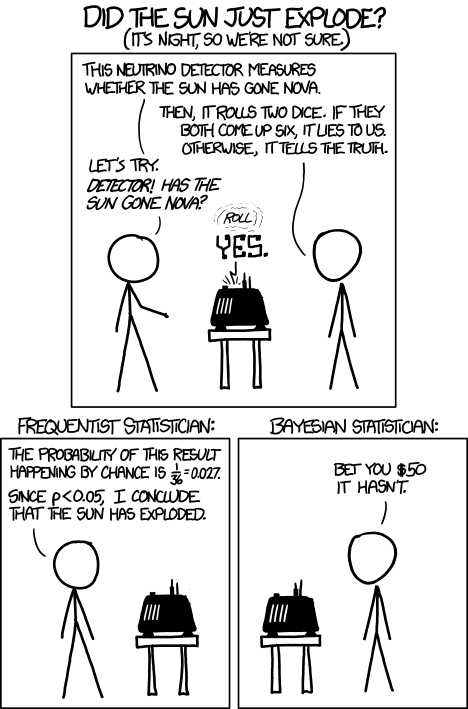Statistical zealots
26 Nov 2013Yesterday my data sharing policy went a little bit viral. It hit the front page of Hacker News and was a trending repo on Github. I was reading the comments on Hacker News and came across this gem:
So, while I can imagine there are good Frequentists Statisticians out there, I insist that frequentism itself is bogus.
This is the extension of a long standing debate about the relative merits of frequentist and Bayesian statistical methods. It is interesting that I largely only see one side of the debate being played out these days. The Bayesian zealots have it in for the frequentists in a big way. The Hacker News comments are one example, but here are a [Yesterday my data sharing policy went a little bit viral. It hit the front page of Hacker News and was a trending repo on Github. I was reading the comments on Hacker News and came across this gem:
So, while I can imagine there are good Frequentists Statisticians out there, I insist that frequentism itself is bogus.
This is the extension of a long standing debate about the relative merits of frequentist and Bayesian statistical methods. It is interesting that I largely only see one side of the debate being played out these days. The Bayesian zealots have it in for the frequentists in a big way. The Hacker News comments are one example, but here are a](http://wmbriggs.com/blog/?p=5062) more. Interestingly, even the “popular geek press” is getting in the game.

I think it probably deserves a longer post but here are my thoughts on statistical zealotry:
- User effect »»»»»»»»> Philosophy effect. The person doing the statistics probably matters more than the statistical philosophy. I would prefer Andrew Gelman analyzed my data than a lot of frequentists. Similarly, I’d prefer that John Storey analyzed my data than a lot of Bayesians.
- I agree with Noahpinion that this is likely mostly a philosophy battle than a real practical applications battle.
- I like Rob Kass’s idea that we should move away from frequentist vs. Bayesian to pragmatism. I think most real applied statisticians have already done this, if for no other reason than being pragmatic helps you get things done.
- Papers like this one that claim total victory for one side or the other all have one thing in common: they rarely use real data to verify their claims. The real world is messy and one approach never wins all the time.
My final thought on this matter is: never trust people with an agenda bearing extreme counterexamples.
 Follow us on twitter
Follow us on twitter